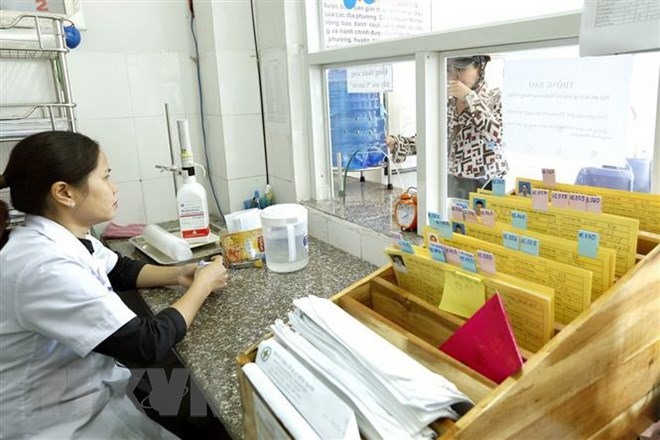 Society
Society

A system of more than 30 local community-based organisations (CBOs) has played an important role in healthcare and HIV prevention for HIV-positive people in Việt Nam over the past 10 years.
 |
| Patient monitoring and management at Bình Định Province’s HIV/AIDS Prevention Center — VNA/VNS Photo Dương Ngọc |
HCM CITY — A system of more than 30 local community-based organisations (CBOs) has played an important role in healthcare and HIV prevention for HIV-positive people in Việt Nam over the past 10 years.
Last week, CBOS met to discuss the status of healthcare for HIV patients with representatives from the Centre for Promotion of Quality of Life (LIFE) and local businesses, with support from USAID and the US President’s Emergency Plan for AIDS Relief Fund (PEPFAR) in Việt Nam.
The meeting was part of LIFE’s Community HIV Link-Southern project (C-Link) on enhancing capacity for CBOs working on HIV/AIDS.
Dr. Bùi Đức Dương, deputy head of the Việt Nam Authority of HIV/AIDS Control (VAAC), said collaboration between CBOs and the public health system was a key factor to increase the number of key populations using prevention and treatment services.
In the last two years, LIFE’s C-Link project helped 32,000 HIV-positive people enroll in care and treatment programmes.
This year, the project was able to detect more than 2,380 new HIV cases, or one-third of the number of HIV-positive patients in HCM City.
CBOs offer HIV tests and treatment referral for MSMs (men who have sex with men) and transgender people.
Their core outreach teams include university students and other youths who work to reach their young peers.
Cao Tấn Thành, a member of Vượt Sóng (Overcome Waves), said he formerly used injected drugs and had received LIFE training since 2011.
He actively supports his peers to connect to methadone and HIV services.
Huỳnh Tiến Đạt, head of CBO Sắc Màu Cuộc Sống (Colours of Life), said: “While conducting lay tests, I always listen and show empathy to my clients, and am ready to support them with care and good services.”
CBOs’ members are professionals who collect and use data for service improvement.
Driven by increased high-tech demand, the group invented the “THEBOY App”, according to Lê Thanh Phương, head of The Boy CBO.
The app features online scheduling with SMS notifications, one-on-one chat functions, and updated HIV information.
Meanwhile, AloBoy CBO provides services for MSMs and male sex workers, using project monitoring and evaluation indicators to better understand clients’ needs and appraise team performance.
The Nụ Sười (Smile) CBO, which targets persons who use injected drugs (PWID), female sex workers, has established a strong linkage with health centres for treatment referral methadone programmes.
It is known for high success in finding drop-outs from the programme and client follow-ups.
Self-funding
Dr Tiêu Thị Thu Vân, head of the HCM City HIV/AIDS Prevention and Control Centre, said there was a lack of proper attention from government agencies toward funding.
All CBOs will have to mobilise domestic resources when international funding falls, as is expected. The aim is to diversify services to secure financial resources and capacity for sustainability through many approaches.
Phạm Hồng Sơn, head of G3VN organisation, said: “We seek the private sector’s support such as calling for donations and subsidised condoms at wholesale rates.”
The group also creates online marketing, and door-to-door goods delivery to generate more jobs and incomes for members.
Meanwhile, the head of the Glink community-based organisation, said that Glink had opened three juice and coffee shops, and a men’s health clinic with a pharmacy.
LIFE is a non-profit Vietnamese social organisation established in 2007 under the Việt Nam Union of Science and Technology Association.
Nguyễn Nguyên Như Trang, director of LIFE, said that LIFE training helps CBOs to become more innovative and builds staff capacity.
She said that partnerships between CBOs and the government were the key for faster, cost-effective achievement of a national HIV response.
The deputy principal officer of the US consulate general in HCM City, Timothy Liston, praised the CBOs’ contributions in fighting HIV/AIDS in Việt Nam and called for more public-private partnerships (PPP) in HIV prevention services.
At the event, four comprehensive cooperation agreements were also signed, including one between Khánh Hòa Province’s Centre for HIV/AIDS Prevention and Control and LIFE, a Public Outpatient Clinic of District 1 in HCM City and community organisation G3VN, Việt Hưng Garment Joint Stock Company and CBO experts, and another between the EasyCare Network and Galant Clinic in HCM City.
The workshop attracted more than 200 representatives from departments and agencies, domestic and foreign NGOs from HCM City and the provinces of Khánh Hòa, Bình Dương, Đồng Nai, Bà Rịa- Vũng Tàu and Tây Ninh. — VNS




